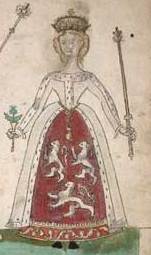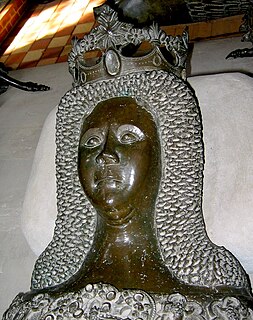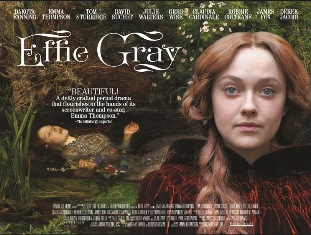Related Research Articles
The Earl or Mormaer of Ross was the ruler of the province of Ross in northern Scotland.
William Douglas, 6th Earl of Morton was the son of Robert Douglas of Lochleven and Margaret Erskine, a former mistress of James V of Scotland.
George Gordon, 4th Earl of Huntly was a Scottish nobleman.
WilliamIII, 5th Earl of Ross was a fourteenth-century Scottish nobleman. He was the fifth O’Beolan earl of Ross, descending from the founder of the line, Fearchar of Ross.

Euphemia, known as the All-praised in the Eastern Orthodox Church, was a virgin, who was martyred for her faith at Chalcedon in 303 AD.
Euphemia I, also called Euphemia of Ross and Euphemia Ross, and sometimes incorrectly styled Euphemia Leslie and Euphemia Stewart, was a Countess of Ross in her own right.

The status of Women in the Protestant Reformation was deeply influenced by Bible study, as the Reformation promoted literacy and Bible study in order to study God's will in what a society should look like. This influenced women's lives in both positive and negative ways, depending on what scripture and passages of the Bible were studied and promoted. The ideal of Bible study for commoners improved women's literacy and education, and many women became known for their interest and involvement in public debate during the Reformation. In parallel, however, their voices were often suppressed because of the edict of the Bible that women were to be silent. The abolition of the female convents resulted in the role of wife and mother becoming the only remaining ideal for a woman.

Euphemia de Ross (1329–1386), a member of Clan Ross, was Queen of Scots as the second wife of Robert II of Scotland.
Clan Charteris is a Scottish clan of the Scottish Lowlands.
Alexander Leslie, Earl of Ross was a Scottish nobleman. Born between 1367 and 1382, he was the son of Walter Leslie, Lord of Ross and Euphemia I, Countess of Ross. In around 1394 he became Earl of Ross and sometime before 1398 he married Isabel Stewart, daughter of Robert Stewart, Duke of Albany. They had one child, Euphemia. He died at Dingwall, Scotland on 8 May 1402.

Euphemia of Pomerania was Queen of Denmark as the spouse of King Christopher II. She was the daughter of Bogislaw IV, Duke of Pomerania, and his second spouse, Margarete of Rügen.

Agnes Leslie, Countess of Morton was a Scottish noblewoman, being the daughter of George Leslie, 4th Earl of Rothes as well as a great-granddaughter of King James II. She was the wife of William Douglas, 6th Earl of Morton, who as Laird of Lochleven Castle was the custodian of Mary, Queen of Scots during her captivity from June 1567 until her escape on 2 May 1568. Agnes was Queen Mary's chief female companion throughout her imprisonment; thus it was while Lady Agnes was recovering from childbirth that the queen successfully escaped from Lochleven.

Euphemia of Racibórz was a Polish princess member of the House of Piast in the Racibórz branch and Dominican Prioress in Racibórz.
Margaret Stewart was the younger daughter of James II of Scotland and Mary of Guelders. Once engaged to the Lancastrian Prince of Wales, Margaret instead became the mistress of William Crichton, 3rd Lord Crichton, and the mother of his illegitimate daughter, Margaret Crichton, later Countess of Rothes, and possibly his son, Sir James Crichton, progenitor of the Viscounts of Frendraught. Margaret and Lord Crichton may have been married later, after the death of Crichton's wife.
Patrick Leslie, 1st Lord Lindores was a member of the Scottish nobility.
Elcho Priory was a medieval Cistercian priory in Perthshire, Scotland, dedicated to the Virgin Mary.

Effie Gray is a 2014 British biographical film written by Emma Thompson and directed by Richard Laxton, starring Dakota Fanning, Emma Thompson, Julie Walters, David Suchet, Derek Jacobi, James Fox, Robbie Coltrane, Claudia Cardinale, Greg Wise, and Tom Sturridge. It is based on the true story of John Ruskin's marriage to Euphemia Gray and the subsequent annulment of their marriage.
Isabella Hoppringle (1460–1538), was a Scottish prioress and spy. She was the prioress of Coldstream Priory in 1505—1538.
Euphemia Davison, also known by the stage name May Moxon), was a dancer and choreographer. Her stage name is thought to have been taken from her grandmother May and uncle Harold Moxon, an acrobat.
James Lindsay, 7th Lord Lindsay (1554-1601), Scottish landowner.
References
- ↑ Euphemia Leslie, undiscoveredscotland, retrieved 22 April 2014
- The Biographical Dictionary of Scottish Women (Hardcover) by Elizabeth L. Ewan, Sue Innes
- https://web.archive.org/web/20160304034445/http://www.kosmoid.net/saltire/processionNSW